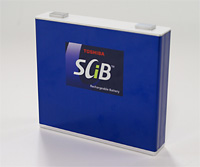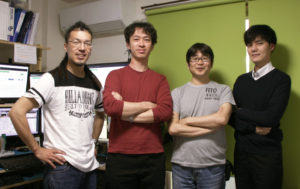Mitsubishi Chooses Super-Efficient Toshiba SCiB Battery For EVs
Mitsubishi Motor Corporation (MMC) have selected Toshiba’s SCiB battery for its i-MiEV and Minicab-MiEV models. The battery uses Toshiba’s proprietary lithium titanate oxide to make a long-life cell that can go through 6000 charging cycles – about 2.5 times more than regular lithium ion batteries. The battery pack can do a rapid 80% recharge in just 15 minutes, and is capable of operating in temperatures as low as minus 30 degrees Celcius.
The SCiB battery pack is also being used by Honda in its EV-neo scooter that it is positioning for corporate use in Japan, as well as an electric bus project by Keio University, an electrical grid power storage system in the southern islands of Okinawa as well as a number of other projects. The main advantage of the SCiB battery for EVs is that it gets about 1.7 times more range than the equivalent lithium ion battery, which therefore means that car makers can either reduce the size and weight of the battery pack (thus also reducing cost and improving efficiency) or, presumably, keep the dimensions the same and offer and extended range.
The ability to recharge quickly is also an important selling point for potential EV customers. A quick charge with a dedicated recharging unit will restore a quarter of the battery capacity in 5 minutes. 10 minutes brings it up to 50% charge, and 80% is reached in just 15 minutes. Not quite as quick as refilling your tank, but then again with the abundance of electrical outlets and the future provision of charging points in parking lots, the idea of actually having to go to a particular place simply to get more energy for your car will seem rather quaint 10 years from now. The battery also emits much lower levels of heat when recharging and also requires less energy for cooling when in use.
The SCiB battery is being manufactured in Toshiba’s Kashiwazaki facilities in Niigata Prefecture on the Japan Sea coast of north east Japan. A new factory dedicated to SCiB production has been built there and started operations in February this year.
Just as in the cell phone market, consumer demand for EVs and hybrids is driving innovation particularly aimed at improving energy density, recharge time and safety. The SCiB battery is a clear example of this and provides a good indication that the EVs of tomorrow are going to be significantly more competitive with regular ICE cars than they are today.
Sources: Kankyo Business (Japanese-language), Automotive Business Review



